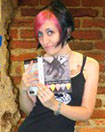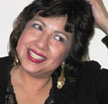What’s in a name? Is it just that or is it as important as the traits attached to that character?
 "To an extent. On one hand, people are going to remember a character called Hermione. On the other, you can include as many unique names as you'd like, but if that character has no personality, they are likely going to fall flat. And in the end, I believe character is more important,. We don't remember Hermione because of her name. We remember her because of what she does in the story." - Aimee Carter, author of The Goddess Test.
"To an extent. On one hand, people are going to remember a character called Hermione. On the other, you can include as many unique names as you'd like, but if that character has no personality, they are likely going to fall flat. And in the end, I believe character is more important,. We don't remember Hermione because of her name. We remember her because of what she does in the story." - Aimee Carter, author of The Goddess Test. "Names are vital to me, they mean so much, they're keys to personality and have to look right on the page. In my upcoming YA, my Magic Most Foul series, beginning with Darker Still (November from Sourcebooks Fire), names and naming is a huge part of the magic used in my world." - Leanna Renee Hieber, author of Darker Still and The Perilous Prophecy of Guard and Goddess.

"I don't place a terrible amount of significance on names. I just want them to sound right for the character. I confess to using baby name books and the Scrivener name generator. (Weird fact: in the four books I've finished, three of the heroines have names that start with E.)" - Sonia Gensler, author of The Revenant.
"The most important thing I strive for when naming a character is to come up with 'clean' names. By that, I mean a name that has no associations for me other than the name of the character. That’s clearly impossible. So I just do my best NOT to name a character after someone I am, have been, or might be married to." - Randy Russell, author of Dead Rules.

















































